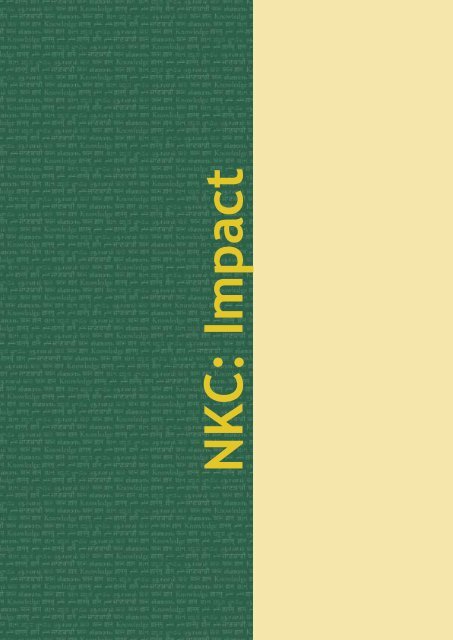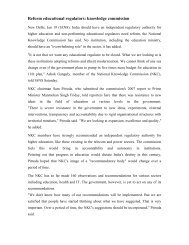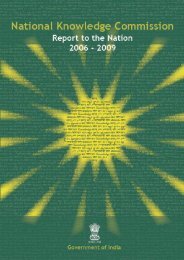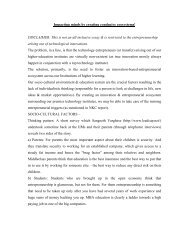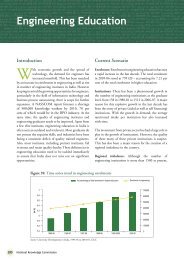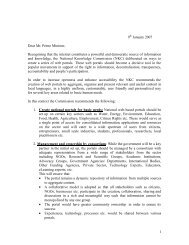NKC Impact - National Knowledge Commission
NKC Impact - National Knowledge Commission
NKC Impact - National Knowledge Commission
- No tags were found...
Create successful ePaper yourself
Turn your PDF publications into a flip-book with our unique Google optimized e-Paper software.
• Facilitate repositioning of employment exchangesas outreach points of the Mission for storing andproviding information on employment and skilldevelopment and to function as career counsellingcentres.• Enlarge the 50,000 Skill Development Centresprogram eventually into a “Virtual SkillDevelopment Resource Network’ for web basedlearning.Innovation (Volume I: Inclusive Growth)• Put in place a <strong>National</strong> Innovation Policy whichencourages competition among enterprises, greaterdiffusion of knowledge and increased support toearly stage technology development initiatives andgrassroot level innovators.• Foster increased collaboration among the R&Dinstitutes, Universities and private sector enterprisesand leverage upon their cumulative strengths indesigning and implementing various innovationprograms.• Create new interface structures to forge partnershipsbetween academia and industry.School education (Volume II: Social Sector)• Reorient Sarva Shiksha Abhiyan bringing in astrong rights focus to make Right to Education areality: ensure basic learning conditions, specialfocus on Math, Science & English, common syllabiand curriculum and pedagogy.• Gradually reduce Central Government’s fundingover the Plan period rather than move immediatelyto 50:50.• Ensure minimum standards and norms forpublic and private schools and address systemicissues of accountability and decentralisation ofdecision making, teacher recruitment, teachertraining, learning outcome measurement, teachermotivation.• Recognise and encourage the role of privateproviders.• Special focus on disadvantaged groups andeducationally backward areas.• Scheme for Universal Access and Quality at theSecondary Stage; set up 6000 Model Schools onein each Block, upgrade 15000 primary schoolsto secondary level, additional infrastructure andadditional teachers, hundred per cent trainedteachers.• Use ICT based pedagogy and learning aids, providebroadband connectivity to all the Government andGovernment aided secondary schools.• Strengthen teacher training and professionaldevelopment.Higher & technical education(Volume II: Social Sector)• Expansion, inclusion and rapid movement in qualityby enhancing public spending, encouraging privateinitiatives and initiating the long overdue majorinstitutional and policy reforms, will form the coreof the XI Plan effort.• Improve quality: work on a detailed reformsagenda including: a) admission, curriculum andassessment; b) accreditation & ratings; c) teacherscompetence and motivation; and d) restructureaffiliated colleges and research for policyformulation.• An apex Independent regulatory mechanismaccompanied by greater autonomy and internalaccountability; establish a high level committee tosuggest specific reforms• Quantitative expansion through establishment ofnew government and private funded institutionsand increased intake in existing institutions.• Reduce disparities based on gender, caste, region etc.through differential support.• Establish 30 new Central Universities, 16 in Stateswhere they do not exist and 14 as World ClassUniversities (all India admissions, course credits,regular syllabi revision, incentives for faculty, stronglinkage with industry and research institutions,no affiliated colleges, outsource non teachingfunctions).• Establish 8 new IITs, 7 new IIMs, 10 new NITs,3 IISERs, 20 IIITs and 2 new SPAs.• Provide flexibility to universities to raise feesaccompanied by scholarships, fellowships andstudent loans.• Establish a <strong>National</strong> Science & Engineering ResearchBoard for rejuvenation of research in Universities.• Launch a national Mission in education throughICT coverage in all the Universities and colleges;broadband connectivity through <strong>National</strong><strong>Knowledge</strong> Network and requisite nodes withininstitutions; to be implemented through anEmpowered Committee.• Revitalise and reform polytechnics through industrylinkage and teacher development, establish 210community colleges and 700 polytechnics.• Strengthen Open Universities and reform statutory166 <strong>National</strong> <strong>Knowledge</strong> <strong>Commission</strong>
odies, scale up SAKSHAT as the education portalfor 50 crore people.Libraries (Volume II: Social Sector)• Develop Public Libraries including Rural PublicLibraries.• Special collections and technological support forvisually challenged and hearing impaired.Translation (Volume II: Social Sector)• A <strong>National</strong> Translation Mission for promotingTranslator education including specialised coursesin translation technology.• Translate at least five good literary works in everylanguage into all other major languages.Legislative framework for public fundedresearch (Volume II: Social Sector)There is a need for an appropriate legislative frameworkfor incentivising innovators and commercialisationof public funded R&D where the Government, therecipients of funds, the inventor as well as the publicbenefit from the protection and commercialisationof IP.Traditional health systems(Volume II: Social Sector)The Plan recognises that no single system of health carehas the capacity to solve all of the society’s health needs.It lays special thrust on strengthening professionaleducation, strategic research programs, promotion of bestclinical practices, technology upgradation in industry,setting internationally acceptable pharmacopeialstandards, conserving medicinal flora, fauna, metals andminerals, utilising human resources of AYUSH in the<strong>National</strong> health programs and strengthening IPRs withthe ultimate aim of enhancing the outreach of AYUSHhealth care in an accessible, acceptable, affordable andqualitative manner.Intellectual property rights(Volume III: Economic Sector)• Undertake the second phase of modernisation ofIP offices to address the needs of human resourcesdevelopment, training and awareness and alsoinfrastructure besides regular updating of the ITfacilities.• Indian IPO would be made an InternationalSearching Authority and an InternationalPreliminary Examining Authority under the PatentCo-operation Treaty of WIPO.Report to the Nation167
Follow Up on <strong>NKC</strong>RecommendationsHighlightsThe Government has been committedto implementing the <strong>Commission</strong>’srecommendations. The action taken includes:Right to education• The Right of Children to Free and CompulsoryEducation Bill, 2008 has been introduced in theParliament.School education• Under the Scheme for Universal Access and Qualityat the Secondary Stage, 6000 high quality ModelSchools are being set up, with at least one schoolin each Block. The first stream will consist of 2500public funded schools (2000 in KVs and 500 inNVs template) in the Educationally BackwardBlocks which have a significant SC, ST, OBC andminority population. The second stream of about2500 schools would be set up through PublicPrivate Partnership in other Blocks with emphasison geographical, demographic, gender and socialequity. Modalities for the remaining 1000 schoolshave yet not been finalised.English language teaching• Twenty five states have already introduced Englishas a subject from Class I. With the help of NCERTand CIEFL, the MHRD is guiding EnglishTeaching in schools in the states/UTs by developingappropriate curriculum, materials and training ofteachers with skills in English.Vocational Education and Training (VET)• For expansion, redesign and quality enhancement ofVET in the country a three tier structure has beenconstituted in July 2008 under the <strong>National</strong> SkillDevelopment Mission (NSDM) consisting of:a) <strong>National</strong> Council on Skill Development: Thefunctions of the Council under the Prime Minister wouldbe to lay down policy objectives, strategies, financing anda governance model to promote skill development.b) <strong>National</strong> Skill Development Coordination Board:The Board will enumerate strategies to implementdecisions of the Prime Minister’s <strong>National</strong> Councilon Skill Development. It would develop operationalguidelines and instructions for meeting larger objectivesof skill development needs of the country and alsomake appropriate practical solutions and strategies tobe adopted by the Union and State Governments.c) <strong>National</strong> Skill Development Corporation: Itwill develop a system of institutionalising measures tothis end.Higher and technical education• To expand capacity and improve quality of highereducation, the Government has sanctioned thesetting up of 15 new Central Universities and 14new Universities based on world-class standards.• The Government is in the process of setting upeight Indian Institutes of Technology (IITs), 10<strong>National</strong> Institutes of Technology (NIT), 20 IndianInstitutes of Information Technology (IIITs) asfar as possible in the Public-Private Partnershipmode, three Indian Institutes of Science Educationand Research (IISERs), seven Indian Institutes ofManagement (IIMs) and two Schools of Planningand Architecture (SPA).• The Committee for Rejuvenation and Renovationof Higher Education, set up for the review ofUGC/AICTE has submitted its report.• The Science and Engineering Research Board Bill2008 has been introduced in the Parliament.• The <strong>National</strong> Mission on Education throughInformation and Communication Technology(ICT) has been launched to leverage the potentialof ICT in the teaching learning process with anaim to enhance the GER in Higher Education168 <strong>National</strong> <strong>Knowledge</strong> <strong>Commission</strong>
<strong>NKC</strong>: State LevelInitiativesMany of the subjects on which the <strong>National</strong><strong>Knowledge</strong> <strong>Commission</strong> has submittedrecommendations fall within the purview ofthe State Governments. Implementation of most of therecommendations, be it reform of existing Universities,revitalising libraries in the region, introduction ofEnglish in schools, are all initiatives that need to beundertaken at the state and district level. In light ofthis, <strong>NKC</strong> has successfully engaged with several StateGovernments to formulate knowledge initiatives at thestate level. It is working with 26 States and 3 UnionTerritories for implementation of its recommendations.Key highlights include:• All States have appointed nodal officers anddepartments for implementation of <strong>NKC</strong>recommendations.• Many State Governments are preparing blueprintsfor reform based on <strong>NKC</strong> recommendations. Theseinclude Rajasthan, Orissa and Andhra Pradesh.The Delhi Government has already approvedan action plan for implementation of <strong>NKC</strong>’srecommendations.• Several states are evaluating setting up a StateBoard of Undergraduate Education to reducethe burden of affiliating colleges on Universities.These Boards would aim to separate the academicfunctions from the administrative functions andprovide quality benchmark.• Karnataka has started a <strong>Knowledge</strong> <strong>Commission</strong> tolay the groundwork for reforms in the knowledgesector in the state. Rajasthan has set up a Rajasthan<strong>Knowledge</strong> Corporation Limited for promoting ITeducation and application of IT systems for processimprovement and knowledge delivery.• As part of the <strong>National</strong> e-Governance Project(NeGP), six state governments – Haryana,Himachal Pradesh, Tamil Nadu, Chandigarh, Delhiand Tripura have implemented State Wide AreaNetwork (SWAN) and in 18 states implementationis in process.170 <strong>National</strong> <strong>Knowledge</strong> <strong>Commission</strong>


